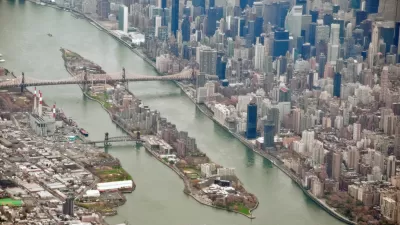Since 2012, New York City has implemented its vision for economic development through NYCEDC, a non-profit corporation charged with deploying city assets to stimulate economic growth.
Many municipalities struggle against their own slow-moving bureaucracy, with its attendant constraints and timeline, to accomplish goals like neighborhood revitalization and job creation. New York City has circumvented this problem, in part, through its more nimble Economic Development Corporation.
NYCEDC oversees city assets like ports and industrial facilities, and a $3 billion portfolio for developing infrastructure. It takes on neighborhood planning, real-estate, and development projects. And it serves strategic planning and implementation functions, helping industries adjust to the global economy as a "think and do tank," in the words of NYCEDC's Tom McKnight.
McKnight gave The Planning Report an account of the organization’s structure, relationship to the city, and methods that have led to its success. Given the breadth of its purview, McKnight says the EDC thinks big picture. When it came to the Roosevelt Island Cornell-Tech project, for instance, the corporation approached a broad economic challenge—how to commercialize academia—and then sought a project to fulfill it. He says:
"The project did not originate with a specific end goal. Instead, it started with an exercise that asked, 'What’s the next big idea for the city? In a changing, global economy, what sorts of things should the City of New York be focusing on to diversify our economy?' Through a thoughtful, step-by-step process, we wound up recognizing that where we were falling short was in the development of tech talent. To solve that issue, we needed to deliver more graduates in the tech arena who would not only study there and work in NYC, but who would also generate ideas, generate businesses, and generate jobs... That led to a more formal procurement.”
FULL STORY: NYC EDC: A Working Model for Urban Investment & Procurement

Alabama: Trump Terminates Settlements for Black Communities Harmed By Raw Sewage
Trump deemed the landmark civil rights agreement “illegal DEI and environmental justice policy.”

Study: Maui’s Plan to Convert Vacation Rentals to Long-Term Housing Could Cause Nearly $1 Billion Economic Loss
The plan would reduce visitor accommodation by 25% resulting in 1,900 jobs lost.

Planetizen Federal Action Tracker
A weekly monitor of how Trump’s orders and actions are impacting planners and planning in America.

Wind Energy on the Rise Despite Federal Policy Reversal
The Trump administration is revoking federal support for renewable energy, but demand for new projects continues unabated.

Passengers Flock to Caltrain After Electrification
The new electric trains are running faster and more reliably, leading to strong ridership growth on the Bay Area rail system.

Texas Churches Rally Behind ‘Yes in God’s Back Yard’ Legislation
Religious leaders want the state to reduce zoning regulations to streamline leasing church-owned land to housing developers.
Urban Design for Planners 1: Software Tools
This six-course series explores essential urban design concepts using open source software and equips planners with the tools they need to participate fully in the urban design process.
Planning for Universal Design
Learn the tools for implementing Universal Design in planning regulations.
Caltrans
Smith Gee Studio
Institute for Housing and Urban Development Studies (IHS)
City of Grandview
Harvard GSD Executive Education
Toledo-Lucas County Plan Commissions
Salt Lake City
NYU Wagner Graduate School of Public Service





























